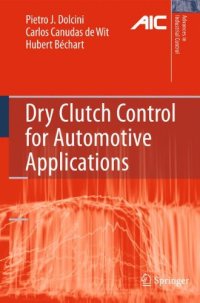
Ebook: Dry Clutch Control for Automotive Applications
- Genre: Science (General)
- Tags: Control, Automotive Engineering, Vibration Dynamical Systems Control
- Series: Advances in Industrial Control
- Year: 2010
- Publisher: Springer-Verlag London
- Edition: 1
- Language: English
- pdf
The comfort of a car as perceived by the driver can be as important to its commercial success as its performance and fuel efficiency. Modern engines deliver increased torque and there is a current trend to reduce transmission-shaft stiffness, both phenomena militating against maintaining, let alone increasing, ride comfort.
Dry Clutch Control for Automotive Applications analyses the control of a part of the powertrain which has a key role in ride comfort during standing-start and gear-shifting manoeuvres. The mechanical conception of the various elements in the driveline has long since been optimised so this book takes a more holistic system-oriented view of the problem featuring:
- a comprehensive description of the driveline elements and their operation paying particular attention to the clutch;
- a non-linear model of the driveline for simulation and a simplified model for control design, complete with a standing-start driver automaton for closed loop simulation;
- a detailed analysis of the engagement operation and the related comfort criteria;
- different control schemes aiming at meeting these criteria;
- friction coefficient and unknown input clutch torque observers;
- practical implementation issues and solutions based on the hands-on experience of implementing optimal engagement strategies on two Renault prototypes.
Dry Clutch Control for Automotive Applications will be essential reading for automotive engineers working on model design and contains much to interest the academic researcher with its combination of theoretical results and application in the important and widely studied field of automotive engineering and control.
Dry Clutch Control for Automated Manual Transmission Vehiclesanalyses the control of a part of the powertrain which has a key role in ride comfort during standing-start and gear-shifting manoeuvres. The mechanical conception of the various elements in the driveline has long since been optimised so this book takes a more holistic system-oriented view of the problem featuring: a comprehensive description of the driveline elements and their operation paying particular attention to the clutch, a nonlinear model of the driveline for simulation and a simplified model for control design, with a standing-start driver automaton for closed loop simulation, a detailed analysis of the engagement operation and the related comfort criteria, different control schemes aiming at meeting these criteria, friction coefficient and unknown input clutch torque observers, practical implementation issues and solutions based on experience of implementing optimal engagement strategies on two Renault prototypes.